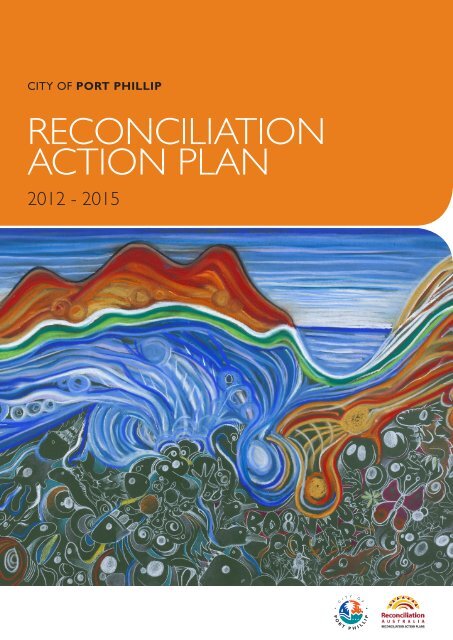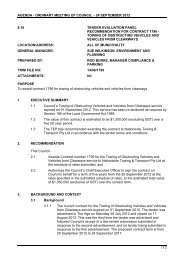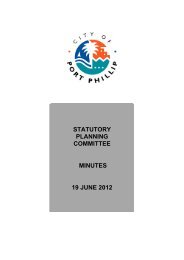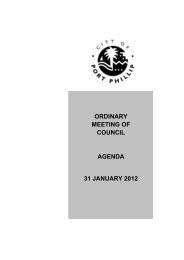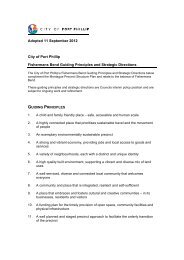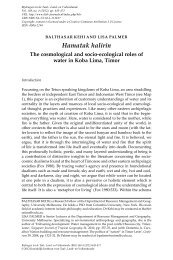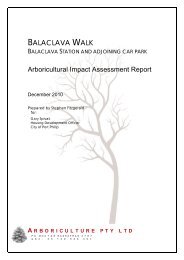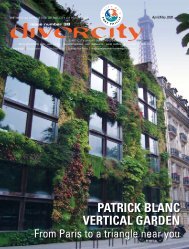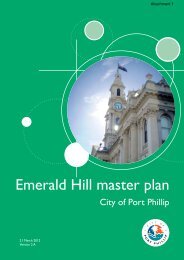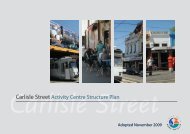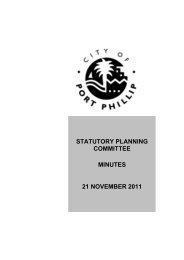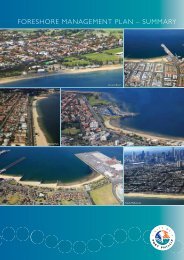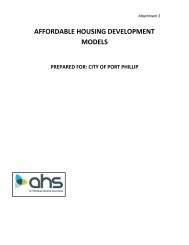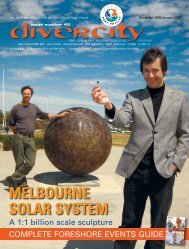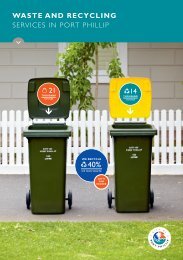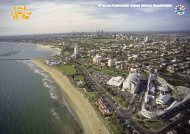Reconciliation Action Plan (2012-2015) - City of Port Phillip
Reconciliation Action Plan (2012-2015) - City of Port Phillip
Reconciliation Action Plan (2012-2015) - City of Port Phillip
You also want an ePaper? Increase the reach of your titles
YUMPU automatically turns print PDFs into web optimized ePapers that Google loves.
CITY OF PORT PHILLIP<br />
RECONCILIATION<br />
ACTION PLAN<br />
<strong>2012</strong> - <strong>2015</strong>
CONTENTS<br />
MAYOR’S FOREWORD..................................................................................................................... 4<br />
STATEMENT OF COMMITMENT............................................................................................... 6<br />
OUR VISION FOR RECONCILIATION.................................................................................... 7<br />
OUR RESPONSIBILITIES.................................................................................................................... 8<br />
OUR RECONCILIATION ACTION PLAN JOURNEY..................................................11<br />
1. RELATIONSHIPS..............................................................................................................................12<br />
Artwork name: ‘Boon Wurrung Country: Connection<br />
to Terrestrial and Marine Landscapes’ by Adam Edwards<br />
Magennis (<strong>2012</strong>).<br />
Medium: Pastel and Chinagraph on board<br />
Brief: Terrestrial and marine environments are<br />
connected by an organic fusion functioning in tandem<br />
to produce what we know as the natural landscape.<br />
Within this landscape, Boon Wurrung people raised<br />
their families and above all else, owned a developed<br />
system for socio-cultural organisation.<br />
2. RESPECT...............................................................................................................................................15<br />
3. OPPORTUNITIES............................................................................................................................18<br />
4. TRACKING PROGRESS AND REPORTING...................................................................20<br />
ACKNOWLEDGEMENTS...............................................................................................................23<br />
This is identified as the cultural landscape <strong>of</strong> Boon<br />
Wurrung country. The cross section snapshot is from the<br />
eastern flank <strong>of</strong> this waterway, heading from St Kilda to<br />
Dromana. Integrated into this cross section <strong>of</strong> country<br />
is the organic collective <strong>of</strong> fauna that inhabit the country.<br />
This artwork represents sustainability in that the natural<br />
order was not harmed or negatively impacted. It is<br />
important to protect and preserve these cross sections<br />
<strong>of</strong> country in order to understand the true nature and<br />
identity <strong>of</strong> the place.
MAYOR’S<br />
FOREWORD<br />
I am very proud to present the inaugural<br />
<strong>City</strong> <strong>of</strong> <strong>Port</strong> <strong>Phillip</strong> <strong>Reconciliation</strong> <strong>Action</strong><br />
<strong>Plan</strong> (<strong>2012</strong>-<strong>2015</strong>). This is the Council’s<br />
guiding policy document on Aboriginal<br />
and Torres Strait Islander issues which has<br />
been developed in consultation with the<br />
Aboriginal and Torres Strait Islander citizens<br />
<strong>of</strong> the area, the <strong>Port</strong> <strong>Phillip</strong> Citizens for<br />
<strong>Reconciliation</strong>, and the broader community.<br />
The plan seeks to realise Council’s vision<br />
for strengthening its diverse and inclusive<br />
community.<br />
We are committed to delivering the <strong>City</strong><br />
<strong>of</strong> <strong>Port</strong> <strong>Phillip</strong> <strong>Reconciliation</strong> <strong>Action</strong> <strong>Plan</strong><br />
and working with the community and other<br />
stakeholders towards reconciliation.<br />
The <strong>City</strong> <strong>of</strong> <strong>Port</strong> <strong>Phillip</strong> respectfully<br />
acknowledges the Yalukit Wilam Clan <strong>of</strong><br />
the Boon Wurrung. We pay our respect<br />
to their Elders, both past and present.<br />
We acknowledge and uphold their<br />
continuing relationship to this land.<br />
The <strong>City</strong> <strong>of</strong> <strong>Port</strong> <strong>Phillip</strong> has a long history <strong>of</strong><br />
acknowledging the dispossession suffered by<br />
Aborigines and Torres Strait Islanders and in<br />
1997 it was one <strong>of</strong> the first local government<br />
areas in Australia to <strong>of</strong>fer an apology to<br />
members <strong>of</strong> the Stolen Generation for pain<br />
and loss suffered from the child removal<br />
policies <strong>of</strong> various governments.<br />
We respect the contribution <strong>of</strong> Aboriginal<br />
peoples and Torres Strait Islanders to<br />
Australian society.<br />
We celebrate the exploits <strong>of</strong> the First<br />
Australians on the sporting field, in the<br />
boardroom, in the classroom, and in the<br />
political arena.<br />
We stand in awe at some <strong>of</strong> the oldest<br />
representations <strong>of</strong> human activity on this<br />
planet through age-old rock art.<br />
We are moved by the sound <strong>of</strong> ancient<br />
languages being spoken, and dance ceremonies<br />
passed down generation by generation.<br />
We want the Aboriginal and Torres Strait<br />
Islander residents <strong>of</strong> <strong>Port</strong> <strong>Phillip</strong> to be made to<br />
feel welcome in a culturally safe environment.<br />
Council is committed to contributing to a<br />
national reconciliation movement, and the<br />
national campaign to ‘close the gap’ in relation<br />
to the life expectancy gap between Aboriginal<br />
and Torres Strait Islander peoples and the rest<br />
<strong>of</strong> Australia.<br />
The <strong>Reconciliation</strong> <strong>Action</strong> <strong>Plan</strong> will focus on<br />
good relationships, respecting the special<br />
contribution <strong>of</strong> Aboriginal and Torres Strait<br />
Islander peoples to Australia, and working<br />
together to ensure they have the same life<br />
opportunities as other Australians.<br />
The <strong>City</strong> <strong>of</strong> <strong>Port</strong> <strong>Phillip</strong> <strong>Reconciliation</strong> <strong>Action</strong><br />
<strong>Plan</strong> <strong>2012</strong>-<strong>2015</strong> provides Council with an<br />
opportunity to work for true reconciliation.<br />
Cr Rachel Powning<br />
Mayor<br />
<strong>City</strong> <strong>of</strong> <strong>Port</strong> <strong>Phillip</strong><br />
On behalf <strong>of</strong> the Yalukit Wilam clan <strong>of</strong> the<br />
Boon Wurrung, the First Peoples <strong>of</strong> the<br />
municipality now known as the <strong>City</strong> <strong>of</strong> <strong>Port</strong><br />
<strong>Phillip</strong>, it gives me great pleasure to endorse<br />
the <strong>City</strong> <strong>of</strong> <strong>Port</strong> <strong>Phillip</strong>’s first <strong>Reconciliation</strong><br />
<strong>Action</strong> <strong>Plan</strong>.<br />
We, as the Yalukit Wilam people <strong>of</strong> the<br />
Boon Wurrung, feel very proud to have<br />
been involved in this <strong>Plan</strong>’s development.<br />
In conjunction with other local Aboriginal<br />
and Torres Strait Islander residents and in the<br />
true spirit <strong>of</strong> reconciliation, we very much look<br />
forward to working with the Council over the<br />
implementation phase.<br />
Carolyn Briggs<br />
Boon Wurrung Senior Elder<br />
Chairperson, Boon Wurrung Foundation<br />
National Female Elder <strong>of</strong> the Year<br />
NAIDOC 2011 (Pictured Above)<br />
<strong>Reconciliation</strong> Australia is pleased to welcome the<br />
<strong>City</strong> <strong>of</strong> <strong>Port</strong> <strong>Phillip</strong>’s first <strong>Reconciliation</strong> <strong>Action</strong> <strong>Plan</strong><br />
(RAP). RAPs are business plans that use a holistic<br />
approach to build meaningful relationships and<br />
create an environment <strong>of</strong> respect and recognition.<br />
By developing and implementing their RAP, the<br />
<strong>City</strong> <strong>of</strong> <strong>Port</strong> <strong>Phillip</strong> has joined a community <strong>of</strong><br />
organisations, large and small, that have committed<br />
to turning good intentions into real actions.<br />
This RAP is the next step in the Council’s<br />
commitment to make the <strong>City</strong> <strong>of</strong> <strong>Port</strong> <strong>Phillip</strong> a<br />
welcoming and culturally safe environment for<br />
Aboriginal and Torres Strait Islander peoples<br />
and other residents, and to working together to<br />
ensure the same life opportunities are available<br />
to all Australians.<br />
Their deep understanding <strong>of</strong> the need to build<br />
strong relationships in an environment that is<br />
appreciative <strong>of</strong> diversity is evident throughout<br />
their plan.<br />
<strong>Reconciliation</strong> Australia thanks the <strong>City</strong> <strong>of</strong> <strong>Port</strong><br />
<strong>Phillip</strong> for taking this important step in promoting<br />
reconciliation. On behalf <strong>of</strong> <strong>Reconciliation</strong><br />
Australia, I wish you well for the important<br />
actions you have set for the coming years.<br />
Leah Armstrong<br />
Chief Executive Officer<br />
<strong>Reconciliation</strong> Australia<br />
4<br />
5
STATEMENT<br />
OF COMMITMENT<br />
OUR VISION<br />
FOR RECONCILIATION<br />
The Council <strong>of</strong> the <strong>City</strong> <strong>of</strong> <strong>Port</strong> <strong>Phillip</strong><br />
acknowledges that Aboriginal and Torres Strait<br />
Islander peoples were the first people <strong>of</strong> this<br />
land and have survived European settlement<br />
for more than two centuries.<br />
The <strong>City</strong> <strong>of</strong> <strong>Port</strong> <strong>Phillip</strong> values its diverse and<br />
multicultural community and encourages<br />
tolerance and respect for all.<br />
The arrival <strong>of</strong> Europeans brought massive<br />
change to the land and to its Aboriginal and<br />
Torres Strait Islander peoples. For its part, <strong>Port</strong><br />
<strong>Phillip</strong> <strong>City</strong> Council acknowledges and grieves<br />
for the loss by the Aboriginal and Torres Strait<br />
Islander peoples <strong>of</strong> their land, their children,<br />
their health and their lives.<br />
We acknowledge the right <strong>of</strong> Aboriginal and<br />
Torres Strait Islander peoples to live according<br />
to their own values and customs and we<br />
commit ourselves to respecting Aboriginal<br />
sacred sites and significant places.<br />
The Council recognises the valuable<br />
contribution to the <strong>Port</strong> <strong>Phillip</strong> region made<br />
by Aboriginal and Torres Strait Islander peoples<br />
and looks forward to a future <strong>of</strong> mutual respect<br />
and harmony.<br />
The Council supports the Aboriginal and Torres<br />
Strait Islander and non-Aboriginal and Torres<br />
Strait Islander peoples <strong>of</strong> Australia working<br />
together for the development <strong>of</strong> a formal<br />
instrument <strong>of</strong> reconciliation.<br />
The <strong>Reconciliation</strong> <strong>Action</strong> <strong>Plan</strong> (<strong>2012</strong>-<strong>2015</strong>)<br />
is our commitment to build on the existing<br />
working relationship the <strong>City</strong> <strong>of</strong> <strong>Port</strong> <strong>Phillip</strong><br />
has with the local Aboriginal and Torres Strait<br />
Islander community.<br />
Our vision is for a Council that supports<br />
citizens, business and community organisations<br />
in the <strong>Port</strong> <strong>Phillip</strong> area working together for the<br />
development <strong>of</strong> a <strong>Reconciliation</strong> <strong>Action</strong> <strong>Plan</strong>.<br />
Council promotes the need for consideration<br />
<strong>of</strong> the local Aboriginal and Torres Strait<br />
Islander community in all <strong>of</strong> Council’s planning<br />
and service delivery activities across physical,<br />
strategic, cultural, recreational and economic<br />
frameworks.<br />
Our vision is to actively advocate and lobby<br />
other levels <strong>of</strong> government and the community<br />
sector for the needs <strong>of</strong> the whole <strong>Port</strong> <strong>Phillip</strong><br />
community, with a special focus on sectors<br />
<strong>of</strong> the community, such as the Aboriginal<br />
and Torres Strait Islander community, who<br />
historically have had a limited voice to express<br />
their needs.<br />
Council is committed to social justice principles<br />
and acknowledges social and cultural differences<br />
that impact on an individual’s and community’s<br />
ability to share on an equitable basis the<br />
resources that provide basic human rights such<br />
as: food, shelter, material goods, education,<br />
health and wellbeing, and access to information.<br />
6<br />
7
OUR<br />
RESPONSIBILITIES<br />
The <strong>City</strong> <strong>of</strong> <strong>Port</strong> <strong>Phillip</strong> is located on the<br />
northern shore <strong>of</strong> <strong>Port</strong> <strong>Phillip</strong> Bay, south <strong>of</strong><br />
Melbourne city centre.<br />
The Council area is in the inner city <strong>of</strong><br />
Melbourne, located between 2 - 8kms<br />
south <strong>of</strong> the Central Business District.<br />
It has an estimated population <strong>of</strong> more<br />
than 97,000 people.<br />
The Council, one <strong>of</strong> 79 local councils in Victoria,<br />
is the local government authority for the<br />
suburbs <strong>of</strong> South Melbourne, <strong>Port</strong> Melbourne,<br />
Albert Park, Middle Park, East St Kilda, Balaclava,<br />
Ripponlea, Elwood, St Kilda and St Kilda West.<br />
The area, particularly St Kilda and Emerald Hill<br />
(South Melbourne) is historically a meeting<br />
place for sections <strong>of</strong> the Melbourne Aboriginal<br />
and Torres Strait Islander community, as well as<br />
visitors from interstate.<br />
The area also draws many Aboriginal and<br />
Torres Strait Islander artists who find the area<br />
conducive to successfully producing their work.<br />
As a local government body, the <strong>City</strong> <strong>of</strong> <strong>Port</strong><br />
<strong>Phillip</strong> provides for the peace, order and good<br />
government <strong>of</strong> the municipality. In 2010/11,<br />
Council had 938 staff (made up <strong>of</strong> 438 fulltime,<br />
305 part time and 151 casual staff).<br />
The Council administers various laws for its<br />
citizens such as land use planning, environment<br />
protections, public health, traffic, parking and<br />
animal management.<br />
The Council maintains community<br />
infrastructure such as roads, bridges, drains,<br />
town halls, libraries, recreation facilities, parks<br />
and gardens.<br />
The <strong>City</strong> <strong>of</strong> <strong>Port</strong> <strong>Phillip</strong> contains a large amount<br />
<strong>of</strong> foreshore area on <strong>Port</strong> <strong>Phillip</strong> Bay, and is<br />
a popular recreational destination, attracting<br />
approximately 8 million visitors each year.<br />
Proximity to the Melbourne CBD ensures<br />
that <strong>Port</strong> <strong>Phillip</strong> is an area in high demand.<br />
Historically, while many areas <strong>of</strong> the<br />
municipality have had a predominantly workingclass<br />
background, higher socio-economic<br />
groups now dominate, following decades <strong>of</strong><br />
gentrification. Low income earners now make<br />
up approximately 20% <strong>of</strong> households.<br />
The total identified Aboriginal and Torres Strait<br />
Islander population <strong>of</strong> <strong>Port</strong> <strong>Phillip</strong> is 236 people<br />
(2006 ABS Census), with many living in St Kilda,<br />
South Melbourne and <strong>Port</strong> Melbourne.<br />
The demographic <strong>of</strong> Aboriginal and Torres<br />
Strait Islander peoples reflects the wider<br />
makeup <strong>of</strong> <strong>Port</strong> <strong>Phillip</strong> which includes a mix<br />
<strong>of</strong> middle and low income residents.<br />
For several years, Council has had service<br />
agreements for Aboriginal and Torres Strait<br />
Islander community activities organised by<br />
Inner South Community Health Service,<br />
<strong>Port</strong> <strong>Phillip</strong> Citizens for <strong>Reconciliation</strong>,<br />
and the Boon Wurrung Foundation.<br />
In 1997, Council was one <strong>of</strong> the first local<br />
government areas in Australia to apologise<br />
to members <strong>of</strong> the Stolen Generations for<br />
the continuing impact <strong>of</strong> their loss.<br />
It has employed an Indigenous Arts Officer<br />
since the mid-1990s, and held the first<br />
Indigenous arts festival in <strong>Port</strong> <strong>Phillip</strong> in 2002.<br />
Council has also engaged with the local<br />
Aboriginal and Torres Strait Islander<br />
community through a series <strong>of</strong> Memoranda<br />
<strong>of</strong> Understanding (MOU) (1998), (2002),<br />
and (2008).<br />
In 2010, the Council employed an Indigenous<br />
Policy Officer to develop and implement its<br />
first <strong>Reconciliation</strong> <strong>Action</strong> <strong>Plan</strong>.<br />
The development and implementation <strong>of</strong><br />
the <strong>Reconciliation</strong> <strong>Action</strong> <strong>Plan</strong> (<strong>2012</strong>-<strong>2015</strong>)<br />
is guided by the <strong>City</strong> <strong>of</strong> <strong>Port</strong> <strong>Phillip</strong> Council<br />
<strong>Plan</strong> (2009-2013), the <strong>City</strong> <strong>of</strong> <strong>Port</strong> <strong>Phillip</strong><br />
Social Justice Charter (2011), the Victorian<br />
Charter <strong>of</strong> Human Rights and Responsibilities<br />
(2006), and the <strong>City</strong> <strong>of</strong> <strong>Port</strong> <strong>Phillip</strong> Health and<br />
Wellbeing <strong>Plan</strong> (2007-2013).<br />
Council also operates under frameworks<br />
created by the United Nations International<br />
Declaration on the Rights <strong>of</strong> Indigenous<br />
Peoples (2007), and <strong>Reconciliation</strong> Australia.<br />
8<br />
9
OUR<br />
RECONCILIATION<br />
ACTION PLAN<br />
JOURNEY<br />
Yalukit Wilam Ngargee: People Place Gathering Festival<br />
The Yalukit Wilam Ngargee (YWN) festival provides a platform for contemporary<br />
Aboriginal and Torres Strait Islander (ASTI) performers and artists to showcase<br />
their works to a diverse audience.<br />
Hosted by the <strong>City</strong> <strong>of</strong> <strong>Port</strong> <strong>Phillip</strong>, the YWN is the opening festival event <strong>of</strong> the<br />
world-renowned 9-day St Kilda Festival.<br />
The YWN attracts crowds between 7000 to 10,000 people whilst satellite programs<br />
throughout the week incorporate exhibitions, live performances and film screenings.<br />
Held in St Kilda’s O’Donnell Gardens, a significant contemporary Indigenous meeting<br />
place, the YWN showcases free to the general public emerging and established ATSI<br />
musicians, dancers and performers, market stall holders, and children’s activities.<br />
The YWN engages and trains local ATSI community members to marshal the main<br />
day and to assist in stage management.<br />
The YWN also incorporates a dance program which in recent years has featured<br />
a traditional Boon Wurrung ceremony being held which hadn’t been performed in<br />
over 150 years. The sunset ceremony, produced by Idja Indigenous Dance Company,<br />
involved over 60 Aboriginal dancers, and ended with large sections <strong>of</strong> the general<br />
public participating in the final dance.<br />
The <strong>City</strong> <strong>of</strong> <strong>Port</strong> <strong>Phillip</strong>’s ongoing commitment<br />
to the development <strong>of</strong> a reconciliation process<br />
at the local government level is reflected in the<br />
<strong>Reconciliation</strong> <strong>Action</strong> <strong>Plan</strong> <strong>2012</strong>-<strong>2015</strong>.<br />
In February 2011, Council endorsed the<br />
development <strong>of</strong> a <strong>Reconciliation</strong> <strong>Action</strong> <strong>Plan</strong><br />
(RAP) for the <strong>City</strong> <strong>of</strong> <strong>Port</strong> <strong>Phillip</strong>.<br />
The RAP will detail a set <strong>of</strong> actions that Council<br />
will undertake to achieve reconciliation across a<br />
range <strong>of</strong> departments.<br />
Progress against actions will be measured.<br />
<strong>Action</strong>s will be guided by issues identified by<br />
the local Aboriginal and Torres Strait Islander<br />
community.<br />
A RAP will give the organisation a framework<br />
for the future, detailing steps and priorities to<br />
achieve equality for Aborigines and Torres<br />
Strait Islanders.<br />
The process for developing a RAP was also<br />
endorsed by the Urban South Local Indigenous<br />
Network, Boon Wurrung Foundation, Inner<br />
South Community Health Service, Indigenous<br />
service providers, and the <strong>Port</strong> <strong>Phillip</strong> Citizens<br />
for <strong>Reconciliation</strong>.<br />
The RAP will be Council’s central policy<br />
document on working with the local Aboriginal<br />
and Torres Strait Islander community.<br />
As part <strong>of</strong> the development process, a <strong>City</strong> <strong>of</strong><br />
<strong>Port</strong> <strong>Phillip</strong> <strong>Reconciliation</strong> <strong>Action</strong> <strong>Plan</strong> Working<br />
Group has been established, made up <strong>of</strong><br />
<strong>City</strong> <strong>of</strong> <strong>Port</strong> <strong>Phillip</strong> staff and managers.<br />
The Working Group, at key stages <strong>of</strong><br />
development, will invite Aboriginal and Torres<br />
Strait Islander community leaders to meetings<br />
for endorsement and oversight.<br />
This group, which meets quarterly, will facilitate<br />
internal discussions over RAP development and<br />
its implementation within Council.<br />
This framework focuses on: good relationships;<br />
respecting the special contribution <strong>of</strong> Aboriginal<br />
and Torres Strait Islander peoples to Australia;<br />
and working together to ensure Aboriginal and<br />
Torres Strait Islander peoples have the same life<br />
opportunities as other Australians.<br />
The development and implementation <strong>of</strong> a RAP,<br />
is consistent with the Council <strong>Plan</strong> to continue<br />
to strengthen our relationship with Aboriginal<br />
and Torres Strait Islanders and actively support<br />
reconciliation (see section 3.1.8).<br />
The RAP will also explore employment<br />
opportunities for Aboriginal and Torres<br />
Strait Islander peoples; will work with local<br />
organisations to build awareness, support and<br />
understanding for Aboriginal and Torres Strait<br />
Islander culture; and enhance cultural and<br />
economic development for local Aboriginal<br />
and Torres Strait Islander peoples.<br />
10<br />
11
1. RELATIONSHIPS<br />
FOCUS AREAS<br />
Recognition/Negotiation/Commitment/Engagement<br />
ACTION RESPONSIBILITY TIMELINE MEASURABLE TARGET<br />
1. RAP Working Group established<br />
and made up <strong>of</strong> Aboriginal<br />
and Torres Strait Islanders<br />
and other staff members with<br />
executive support, to manage the<br />
implementation <strong>of</strong> the RAP<br />
Executive Management Team<br />
Community Development<br />
Short term: Working<br />
Group will meet<br />
quarterly and report<br />
annually.<br />
September <strong>2012</strong><br />
Four meetings per<br />
annum to monitor<br />
progress<br />
Since 1994, when the <strong>City</strong> <strong>of</strong> <strong>Port</strong> <strong>Phillip</strong> commissioned<br />
a report on the needs <strong>of</strong> its Aboriginal and Torres Strait<br />
Islander community, the Council has been committed to<br />
2. RAP Statement <strong>of</strong> Commitment is<br />
embedded into Council’s Aboriginal<br />
and Torres Strait Islanders policy<br />
framework following endorsement<br />
by Councillors.<br />
Executive Management Team<br />
Community Development<br />
Short term:<br />
March 2013<br />
Copies <strong>of</strong> the<br />
Statement <strong>of</strong><br />
Commitment are<br />
sent to all staff, and<br />
included in the<br />
induction package<br />
for new staff.<br />
building effective working relationships. The development<br />
and implementation <strong>of</strong> a <strong>Reconciliation</strong> <strong>Action</strong> <strong>Plan</strong> is the<br />
next step in the Council’s journey <strong>of</strong> recognising the rich<br />
history <strong>of</strong> the area’s Traditional Owners, the Yalukit Wilam<br />
clan <strong>of</strong> the Boon Wurrung.<br />
3. Community Networks – support<br />
the efforts <strong>of</strong> the local Aboriginal<br />
and Torres Strait Islander<br />
community to establish both formal<br />
and informal social networks<br />
through assistance that may include<br />
the provision <strong>of</strong> premises and<br />
other meeting spaces, expertise<br />
and grants.<br />
4. Aboriginal Gathering Place –<br />
support the local Aboriginal and<br />
Torres Strait Islander community’s<br />
efforts to establish an Aboriginal<br />
gathering place in the area.<br />
Community Development<br />
Community Development<br />
Property Services<br />
Short term: review<br />
service agreements<br />
to Aboriginal and<br />
Torres Strait Islander<br />
community groups<br />
annually.<br />
June 2013<br />
Medium term:<br />
evaluate possible<br />
options and consult<br />
with the local<br />
Aboriginal and<br />
Torres Strait Islander<br />
community.<br />
Maintenance and<br />
continuance <strong>of</strong><br />
community network<br />
support.<br />
Identification<br />
<strong>of</strong> potential<br />
Gathering Place.<br />
December 2013<br />
5. <strong>Reconciliation</strong> Groups – continue to<br />
support the activities <strong>of</strong> <strong>Port</strong> <strong>Phillip</strong><br />
Citizens for <strong>Reconciliation</strong> through<br />
service agreement, and practical and<br />
in-kind support.<br />
Community Development<br />
Short term: Service<br />
Agreement reviewed<br />
annually.<br />
June 2013<br />
Annual activity<br />
report presented<br />
at RAP Working<br />
Group meeting.<br />
6. Cultural Promotion – publicise the<br />
contributions and achievements<br />
<strong>of</strong> Aboriginal and Torres Strait<br />
Islander peoples through Council<br />
publications, newsletters, local and<br />
national Aboriginal and Torres Strait<br />
Islander media outlets, and other<br />
media.<br />
Governance and Engagement<br />
(Communications and Engagement)<br />
Short term: progress<br />
is monitored through<br />
reports to the RAP<br />
Working Group.<br />
June 2013<br />
Report annually on<br />
the number <strong>of</strong> stories<br />
with Aboriginal and<br />
Torres Strait Islander<br />
content that are<br />
published in Council<br />
publications with the<br />
aim to have at least<br />
one publication in<br />
each media outlet.<br />
Please note timelines: Short term – within 12 months. Medium term – within 3 years. Long term – greater than 3 years.<br />
12<br />
13
2. RESPECT<br />
Council acknowledges that Aborigines and<br />
Torres Strait Islanders were the first people <strong>of</strong><br />
this land and have survived European settlement<br />
for more than two centuries. Council recognises<br />
the valuable contribution to the <strong>Port</strong> <strong>Phillip</strong><br />
region made by Aboriginal and Torres Strait<br />
Islander peoples and looks forward to a future<br />
<strong>of</strong> mutual respect and harmony.<br />
14<br />
15
FOCUS AREAS<br />
Consultation/Participation/Protocols/Leadership<br />
ACTION RESPONSIBILITY TIMELINE MEASURABLE TARGET<br />
7. Leadership – build capacity<br />
and support opportunities for<br />
Aboriginal and Torres Strait Islander<br />
leadership.<br />
8. Aboriginal Cross-Cultural<br />
Awareness Training for Council staff<br />
9. Cultural Heritage Consultation<br />
– Council to consider potential<br />
impacts <strong>of</strong> development or<br />
rezoning, including consulting with<br />
the Traditional Owners – the Yalukit<br />
Wilam clan <strong>of</strong> the Boon Wurrung.<br />
10. Flying the Aboriginal Flag and the<br />
Torres Strait Islander Flag - the<br />
Aboriginal and Torres Strait Islander<br />
flags will be flown everyday at St<br />
Kilda Town Hall except on instances<br />
when a special event is taking place<br />
or request has been made to fly<br />
a different flag and it is granted<br />
(where this happens, this will be for<br />
a short period <strong>of</strong> up to a day).<br />
11. Welcome to Country –involves a<br />
Traditional Owner or community<br />
leader welcoming people to the land<br />
at the beginning <strong>of</strong> a civic event or<br />
ceremony. Council will commission<br />
the services <strong>of</strong> the Traditional<br />
Owners, the Yalukit Wilam clan <strong>of</strong> the<br />
Boon Wurrung, to conduct ‘welcomes<br />
to country’ at civic events through<br />
annual service agreements. Council<br />
will ensure a ‘welcome to country’ or<br />
acknowledgement <strong>of</strong> country* (see<br />
next action) will be conducted for all<br />
major civic events.<br />
Community Development<br />
People and Organisational<br />
Development<br />
<strong>City</strong> Strategy (Strategic <strong>Plan</strong>ning)<br />
<strong>City</strong> Development<br />
(Statutory <strong>Plan</strong>ning)<br />
Community and Councillor<br />
Support<br />
Community Development<br />
Community and Councillor<br />
Support<br />
Medium term:<br />
December 2014<br />
Medium term:<br />
December 2014<br />
Medium term:<br />
December 2014<br />
Short term:<br />
June 2013<br />
Short term:<br />
December <strong>2012</strong><br />
Support the Elders Working Group<br />
by providing Council meeting space.<br />
Support opportunities to boost<br />
Aboriginal and Torres Strait Islander<br />
youth leadership.<br />
All new and existing staff<br />
undertakes training on Aboriginal<br />
and Torres Strait Islander cultural<br />
awareness. This commitment is<br />
incorporated into People and<br />
Organisational Development Policy.<br />
An annual review for reporting<br />
on programs involving Traditional<br />
Owner negotiation or consultation.<br />
An annual review will be<br />
prepared on the number <strong>of</strong><br />
applicants required to prepare an<br />
archaeological assessment.<br />
Monitor the number <strong>of</strong> days the<br />
Aboriginal flag and Torres Strait<br />
Islander flag is flown at the<br />
St Kilda, <strong>Port</strong> Melbourne, and<br />
South Melbourne Town Halls.<br />
Develop a protocol outlining<br />
the processes for a ‘welcome<br />
to country’. Communicate<br />
this protocol throughout<br />
the Council, and evaluate its<br />
uptake at RAP Working Group<br />
meetings.<br />
ACTION RESPONSIBILITY TIMELINE MEASURABLE TARGET<br />
13. Aboriginal and Torres Strait Islander<br />
Arts Strategy – ensure resources<br />
are available for annual Aboriginal<br />
and Torres Strait Islander arts<br />
calendar. Input on the Aboriginal and<br />
Torres Strait Islander arts program<br />
will be received via local networks<br />
such as Local Indigenous Network.<br />
14. Signage – increase the use <strong>of</strong> signs<br />
in public locations that pay respect<br />
to the area’s Traditional Owners –<br />
the Yalukit Wilam clan <strong>of</strong> the<br />
Boon Wurrung.<br />
15. Corporate Identity – update and<br />
revamp the Aboriginal and Torres<br />
Strait Islander content on Council’s<br />
website and intranet.<br />
16. Education - make available a range<br />
<strong>of</strong> resources for children and young<br />
adults to educate them about<br />
Aboriginal and Torres Strait Islander<br />
culture and history. Resources<br />
would be appropriate to different<br />
stages <strong>of</strong> a child or young person’s<br />
development.<br />
17. Sorry Business (A traditional time<br />
<strong>of</strong> mourning for the Aboriginal and<br />
Torres Strait Islander community) –<br />
when a death occurs, funding may<br />
be available for activities and events<br />
that recognise the contribution <strong>of</strong><br />
significant members <strong>of</strong> the local<br />
Aboriginal and Torres Strait Islander<br />
community.<br />
Culture and Leisure<br />
(Indigenous Arts Officer)<br />
Parks and Open Spaces<br />
Governance and Engagement<br />
(Communications and<br />
Engagement)<br />
Community Development<br />
Family Youth and Children<br />
Community Development<br />
Medium term:<br />
June <strong>2015</strong><br />
Medium term:<br />
June 2014<br />
Medium term:<br />
June 2013<br />
Medium term:<br />
March <strong>2015</strong><br />
Medium term:<br />
March 2014<br />
An Aboriginal and Torres Strait<br />
Islander Arts calendar is developed<br />
following consultation on its<br />
development.<br />
An annual report is prepared<br />
on the number <strong>of</strong> new signs<br />
that are introduced in parks and<br />
open spaces that acknowledges<br />
the Aboriginal and Torres Strait<br />
Islander peoples and culture.<br />
That new Aboriginal and<br />
Torres Strait Islander content is<br />
uploaded, content management<br />
processes are developed, and<br />
an updated Aboriginal and<br />
Torres Strait Islander directory is<br />
established.<br />
Each Council run maternal and<br />
child health centre, child care<br />
centre and adventure playground<br />
makes resources available on<br />
Aboriginal and Torres Strait<br />
Islander culture and history.<br />
Report annually on Council’s<br />
history <strong>of</strong> supporting the local<br />
Aboriginal and Torres Strait<br />
Islander community when a<br />
death occurs.<br />
Bereavement fund to be<br />
established.<br />
12. Acknowledgement <strong>of</strong> Country –<br />
involves either Aboriginal and Torres<br />
Strait Islander people (who are<br />
not Traditional Owners) or non-<br />
Indigenous people acknowledging<br />
and showing respect for the Yalukit<br />
Wilam clan <strong>of</strong> the Boon Wurrung,<br />
the Traditional Owners <strong>of</strong> the<br />
land on which the event is taking<br />
place. Council will encourage an<br />
‘acknowledgement <strong>of</strong> country’ for all<br />
other Council meetings and events.<br />
Governance and Engagement<br />
(Communications and<br />
Engagement)<br />
Strategic Relationships Advisor<br />
Community and Councillor<br />
Support<br />
Short term:<br />
December <strong>2012</strong><br />
Develop a protocol outlining<br />
the processes and language to<br />
use for an ‘acknowledgement<br />
<strong>of</strong> country’. Communicate this<br />
protocol throughout the Council,<br />
and evaluate its uptake at RAP<br />
Working Group meetings.<br />
16<br />
17
3. OPPORTUNITIES<br />
FOCUS AREAS<br />
Inclusion/Employment/Development<br />
ACTION RESPONSIBILITY TIMELINE MEASURABLE TARGET<br />
18. That Council develop, deliver,<br />
and monitor an Aboriginal and<br />
Torres Strait Islander Economic<br />
Development Strategy, which<br />
includes an Aboriginal Employment<br />
Strategy, and advocate for<br />
Indigenous Australians to start their<br />
own business.<br />
People and Organisational<br />
Development<br />
<strong>City</strong> Strategy<br />
(Economic Development)<br />
Community Development<br />
Medium term:<br />
December<br />
2014<br />
That the strategy is developed and<br />
Council endorsed. Progress will be<br />
reviewed annually. That Council take<br />
on at least one Aboriginal and Torres<br />
Strait Islander trainee per year.<br />
That 2% <strong>of</strong> total staff by 2020 are<br />
Aboriginal or Torres Strait Islander.<br />
Creating opportunities to build the capacity <strong>of</strong> the<br />
local Aboriginal and Torres Strait Islander community<br />
to self-determine their future is one <strong>of</strong> the Council’s<br />
key directions under the Councils <strong>Plan</strong>’s goal <strong>of</strong><br />
‘Strengthening Our Diverse and Inclusive Community’.<br />
19. Naming – review the process <strong>of</strong><br />
consultation in relation to place<br />
naming <strong>of</strong> new Council facilities,<br />
reserves and open spaces<br />
ensuring input from Traditional<br />
Owners – the Yalukit Wilam clan<br />
<strong>of</strong> the Boon Wurrung.<br />
20. Support for the aims <strong>of</strong> ‘Close<br />
the Gap’ health funding initiatives<br />
– Council to provide meeting<br />
space to Urban South Close the<br />
Gap reference groups and local<br />
health service providers. Council<br />
will advocate that <strong>Port</strong> <strong>Phillip</strong><br />
area receives a proportionate<br />
allocation <strong>of</strong> ‘Close the Gap’<br />
health funding earmarked for the<br />
Southern Metropolitan Region.<br />
Council will ensure Aboriginal<br />
and Torres Strait Islander issues<br />
are considered by local primary<br />
care partnerships.<br />
21. Recognition <strong>of</strong> significant<br />
Aboriginal and Torres Strait<br />
Islander dates - Council will<br />
actively support key Aboriginal<br />
and Torres Strait Islander dates<br />
including Australia (Invasion<br />
or Survival) Day, Sorry Day,<br />
Mabo Day, NAIDOC Week,<br />
<strong>Reconciliation</strong> Week, and Yalukit<br />
Wilam Ngargee.<br />
Governance and Engagement<br />
Community Development<br />
Community Development<br />
Community Development<br />
Culture and Leisure<br />
Medium term:<br />
December<br />
2014<br />
Medium term:<br />
June <strong>2015</strong><br />
Short term:<br />
June 2013<br />
Report annually on the number <strong>of</strong><br />
new names recognising Aboriginal<br />
and Torres Strait Islander people<br />
and culture.<br />
That a process for consultation<br />
with Traditional Owners – the<br />
Yalukit Wilam Clan <strong>of</strong> the Boon<br />
Wurrung - is in place.<br />
‘Close the Gap’ health initiatives<br />
are developed, launched and<br />
implemented.<br />
Aboriginal and Torres Strait<br />
Islander issues are acknowledged<br />
in the strategic documents <strong>of</strong> local<br />
primary care partnerships.<br />
All significant Aboriginal and Torres<br />
Strait Islander dates be included<br />
into the Council calendar <strong>of</strong> events,<br />
and recognised, by <strong>2015</strong>.<br />
22. Sustainability – Aboriginal and<br />
Torres Strait Islander concepts<br />
<strong>of</strong> environmental and social<br />
sustainability to be researched<br />
and incorporated into Council<br />
publications<br />
Sustainability<br />
Medium term:<br />
June <strong>2015</strong><br />
Aboriginal and Torres Strait<br />
Islander sustainability case studies<br />
and research to be compiled in<br />
a Council document and publicly<br />
available by <strong>2015</strong>.<br />
23. Food Security – Council will<br />
support initiatives which ensure<br />
that Aborigines and Torres Strait<br />
Islanders in <strong>Port</strong> <strong>Phillip</strong> have<br />
access to sufficient, affordable,<br />
and quality sources <strong>of</strong> food.<br />
Council will review and research<br />
food security issues in <strong>Port</strong> <strong>Phillip</strong><br />
including the need and likely use<br />
<strong>of</strong> an Aboriginal and Torres Strait<br />
Islander-managed Community<br />
Garden.<br />
Community Development<br />
Medium term:<br />
June <strong>2015</strong><br />
Research into food security issues<br />
faced by the Aboriginal and Torres<br />
Strait Islander community in <strong>Port</strong><br />
<strong>Phillip</strong> to be completed.<br />
Council will support Aboriginal<br />
and Torres Strait Islander<br />
gatherings around food, such as<br />
the Wominjeka BBQ, and Our<br />
Rainbow Place BBQ.<br />
18<br />
19
4. TRACKING PROGRESS<br />
AND REPORTING<br />
FOCUS AREAS<br />
Measure/Review/Update<br />
ACTION RESPONSIBILITY TIMELINE MEASURABLE TARGET<br />
To ensure the process stays on track and meets<br />
<strong>Reconciliation</strong> Australia guidelines, the Council will<br />
measure, and review progress, and update targets<br />
on a regular basis to maintain momentum and<br />
maximise outcomes.<br />
24. RAP reporting – Council monitor<br />
implementation <strong>of</strong> the RAP<br />
through the Working Group<br />
meetings and annual reports.<br />
25. Aboriginal and Torres Strait<br />
Islander Community Survey –<br />
Council will gather data on the<br />
local Aboriginal and Torres Strait<br />
Islander community to assist in the<br />
development <strong>of</strong> policy. Council will<br />
aim for this to be reported in the<br />
first 12 months <strong>of</strong> the RAP.<br />
26. <strong>Port</strong> <strong>Phillip</strong> Attitude to<br />
<strong>Reconciliation</strong> Survey – Council<br />
will gather data to gauge the<br />
attitudes <strong>of</strong> <strong>Port</strong> <strong>Phillip</strong> residents<br />
towards the Aboriginal and Torres<br />
Strait Islander community and<br />
reconciliation. Follow-up surveys<br />
will measure whether attitudes<br />
change over time.<br />
<strong>Reconciliation</strong> <strong>Action</strong> <strong>Plan</strong> Working<br />
Group<br />
Community Development<br />
Community Development<br />
Short term: June 2013<br />
Short term: March<br />
2013<br />
Medium term:<br />
December 2014<br />
Outline annual<br />
progress in<br />
implementing the<br />
RAP. Reporting will<br />
be against each<br />
applicable Council<br />
department.<br />
Survey analysis<br />
completed and<br />
available to public.<br />
Survey analysis<br />
completed and<br />
available to public.<br />
27. RAP Promotion – that the RAP be<br />
promoted internally within CoPP<br />
and made available to the public<br />
on the Council website and the<br />
<strong>Reconciliation</strong> Australia website.<br />
Governance and Engagement<br />
(Communications and Engagement)<br />
Short term:<br />
September <strong>2012</strong><br />
RAP promoted on<br />
Council website<br />
and intranet. RAP<br />
to be published<br />
on <strong>Reconciliation</strong><br />
Australia website.<br />
28. Annual Reporting - RAP is<br />
reported on annually, and a new<br />
RAP is developed in early <strong>2015</strong>.<br />
Executive Management Team<br />
<strong>Reconciliation</strong> <strong>Action</strong> <strong>Plan</strong> Working<br />
Group<br />
Short term:<br />
September <strong>2012</strong><br />
RAP evaluated and<br />
reviewed by mid-<br />
<strong>2015</strong>.<br />
20<br />
21
ACKNOWLEDGEMENTS<br />
The <strong>City</strong> <strong>of</strong> <strong>Port</strong> <strong>Phillip</strong> would like to acknowledge the<br />
support and input <strong>of</strong> the following organisations during<br />
the development <strong>of</strong> its <strong>Reconciliation</strong> <strong>Action</strong> <strong>Plan</strong>:<br />
<strong>Reconciliation</strong> Australia, <strong>Reconciliation</strong> Victoria, Boon<br />
Wurrung Foundation, Urban South Local Indigenous<br />
Network, <strong>Port</strong> <strong>Phillip</strong> Citizen’s for <strong>Reconciliation</strong>, Yalukit<br />
Wilam Elders Working Group, Inner South Community<br />
Health Service, Southern Metropolitan Close the Gap<br />
Committee, Victorian Local Government Association,<br />
Municipal Association <strong>of</strong> Victoria, Local Government<br />
Pr<strong>of</strong>essionals Indigenous Special Interest Group, Ngwala<br />
Willumbong Cooperative, Galliamble Recovery Centre<br />
(men), Winja Ulupna Recovery Centre (women).<br />
We would like to thank the following groups for their<br />
contribution to the launch: Black Olive Catering,<br />
St Kilda Indigenous Men’s Group, Adam Magennis,<br />
Gavin Somers, Boris Feldmann (TV Sputnik),<br />
Steven Rhall and Uncle Larry Walsh.<br />
All images <strong>of</strong> vegetation feature plants native to<br />
the <strong>City</strong> <strong>of</strong> <strong>Port</strong> <strong>Phillip</strong>, which were traditionally<br />
used as food or medicinal agents by the First Peoples,<br />
the Yalukit Wilam Clan <strong>of</strong> the Boon Wurrung.<br />
Graphic design by Deadly Design.<br />
Printed on 100% Australian made<br />
recycled paper using vegetable based inks.<br />
22<br />
23
July <strong>2012</strong><br />
<strong>City</strong> <strong>of</strong> <strong>Port</strong> <strong>Phillip</strong><br />
Private Bag No 3<br />
PO St Kilda, VIC, 3182<br />
Phone: (03) 9209 6777<br />
TTY # 9209 6713<br />
www.portphillip.vic.gov.au<br />
For further information on the plan contact:<br />
Todd Condie<br />
Indigenous Policy Officer<br />
Community Development<br />
<strong>City</strong> <strong>of</strong> <strong>Port</strong> <strong>Phillip</strong><br />
(03) 9209 6818<br />
tcondie@portphillip.vic.gov.au


